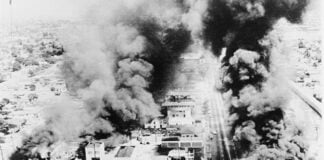Directed by Chris Nolan
THE DARK KNIGHT, sequel to Batman Begins, is the latest recreation of the 70 year old modern myth that is The Batman. These two movies by Chris Nolan (Memento) are an attempt to make a “realistic” superhero movie that fits our turbulent times.
Gone are the Adam West era camp and the (little better) hyper villains of Tim Burton and Joel Schumacher’s 90s movies. This is a world that is recognisably our own.
Gotham City is Chicago shot on a stormy afternoon, organised crime is indistinguishable from the establishment, and the barrel of corrupt cops is spoiled by a few good apples.
The war on terror has become the “background noise” of the blockbuster, just as the Cold War was for the 1980s.
While the Joker employs the petrol bomb and youtube-style video, the Batman responds with extra judicial violence, universal surveillance and vigorous interrogation technique.
Batman is the necessary evil of capitalism, fighting terror with more terror.
Following this path, heroes can turn into villains however, as happens to White Knight DA Harvey Dent, who becomes Two Face.
Justice is an impossible lie, and even the most trustworthy can turn vicious. In fact it is the Batman’s methods that allow the Joker to emerge. The very success of the Batman in weakening organised crime leads them to desperate measures: the Joker is the Batman’s blowback.
Compelling
What drives this action thriller’s success is the sophistication of its villain: Heath Ledger’s Joker.
The Joker is shudderingly unpleasant, a disturbed force of nature onto which our fears are projected: wayward youth with knives, faceless terrorists and mass destruction.
He’s a villain that is more compelling and more human than a stiff-backed Batman. One scene sees the Joker torching a mountain of cash, saying that, “It’s not about the money, it’s about sending a message.”
Beneath his mask of fear (just like the Batman’s) the Joker is a master strategist who plays a series of games that are designed to break society open. He wants society’s heroes to admit they are villains—hypocrites—and admit their law and order world is a sham.
The conflicted hero/villain vigilante has been a theme since the beginning of Batman, who in the best writing, is portrayed as just as mentally tortured and dangerous as the villains he confronts. Unfortunately the film does not push as far as it could in this direction.
But it does successfully revive the gothic 1930s original of Bob Kane and owes much to the dystopic 1980s vision of The Batman in Frank Miller’s The Dark Knight Returns and Alan Moore’s (V for Vendetta, The Watchmen) The Killing Joke.
These books, along with Moore’s other work imagine the social and political consequences of super heroes and villains in our real world. These consequences are typically social ruin, dictatorship or revolution.
One can argue about whether the film’s ideas are subtle or just confused. But it’s good to see a massively successful film with no happy ending, no glory and no easy answers. While lacking the analysis of Syriana or Salt of the Earth, the shift in political tone of the modern blockbuster is a welcome step forward. Enjoy it for what it is.
By Eric Adams





